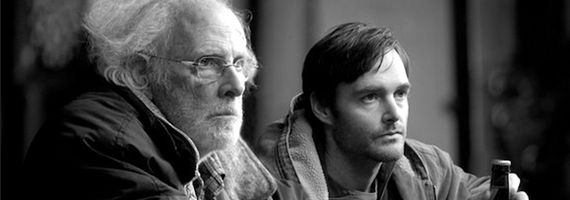
Nebraska (2013) Directed by Alexander Payne. Starring: Bruce Dern, Will Forte, & June Squibb. IMDB says: “An aging, booze-addled father makes the trip from Montana to Nebraska with his estranged son in order to claim a million dollar Mega Sweepstakes Marketing prize.”

I’ve never had much interest in the middle part of America. There’s a line of states from North Dakota to Oklahoma that I especially could go my whole life without visiting. Growing up in the suburbs of a city has made small town living seem quite strange to me. Watching Nebraska wasn’t opinion changing in that regard, but Alexander Payne made his home state a character to be interested in, even if you’re not admiring it.
The film starts with a very old man, Woody Grant (Bruce Dern) struggling to make his way by foot from Montana to Nebraska to collect a million dollar prize that won’t be waiting for him. A sheriff returns him home, but Woody is still convinced that he needs to make it to Lincoln by Monday even though everyone is trying to explain that his “prize” is just a marketing ploy. His son David (Will Forte) finally agrees to drive him there, just to make his father happy and give up his quest.
You’re quickly let into this Grant family and the issues they’ve been dealing with. Woody’s been an alcoholic practically his whole life and his fathering style is far from devoted, while David’s mother Kate (June Squibb) is relentlessly harsh but obviously from years of dealing with bull shit. David himself is a bit lost in his middle age, a single electronics salesman without much to show for himself, with an older brother Ross (Bob Odenkirk) who’s married with children and an anchor for the Billings news.
On David and Woody’s trip you get a great idea of their dysfunction before they make a detour to visit Woody’s hometown where the rest of the Grant’s reside along with old friends who all seem to think Woody owes them a piece of his prize earnings. It’s here that you can really tell Payne and screenwriter Bob Nelson know these people. All the characters that populate the town just fit perfectly as if they actually had lived in those houses and gone to those bars all their lives. Most of them are quite charmless but they feel real and not like caricatures of bad people.
Much of this film is sort of sad, but there’s a simplicity to this living that shines through from those characters that seem well suited for it, like the lovely Peg Nagy (Angela McEwan) who runs the local newspaper. It’s this portrait of a small town that gives the background to how someone like Woody Grant could come to be in his position, on his way out of this world but still just barely hanging on to what he can within it.
Bruce Dern is fantastic at keeping everything going on in Woody’s mind just under the surface. He’s an alcoholic and stubborn as hell but you just can’t quite tell if he’s really as blank on the inside as he appears on the outside. You think it might be his old age making him so quiet and gruff, but when you learn that he’s always been that way your heart breaks just a bit thinking he never had much of a chance to be better.
The breakout performance of the film though goes to Will Forte. He’s funny enough in subtle ways, but what he shows here that we’ve never been privy to is his dramatic chops. David has a melancholy core that makes him both disillusioned with his father but eager to try to give one last shot to forging a connection. He tries so hard to do something right, something good but it just doesn’t seem to be working. Forte is perfect in the role and the grace he lends the character is unexpected.
On the sidelines is June Squibb who steals scenes throughout with her loud mouth that says whatever is on her mind without shame. She provides plenty of laugh out loud moments and I hope to see her name in the running for supporting actress nominations. My one complaint of the film is that there’s not enough Bob Odenkirk although his character is used in the right dosage.
This after all is a road movie when you boil it down, about a father and son both going after one last thing that might bring some solace and satisfaction after a life of discontent. It makes the choice of black and white to film the plain landscapes and simple characters rather fitting. Payne has made a film quite personal and effecting, one that sits well against his catalog but also stands out. He didn’t make a film that will make you want to book a flight to Omaha, but he made one that pays homage good or bad to where he grew up.


